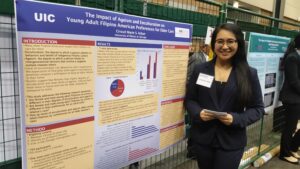Other Undergraduates
 Crissel Marie Arban completed her paper titled The Impact of Ageism and Enculturation on Young Adult Filipino American Preferences for Elder Care at the University of Illinois, Chicago honors program. Her abstract is below.
Crissel Marie Arban completed her paper titled The Impact of Ageism and Enculturation on Young Adult Filipino American Preferences for Elder Care at the University of Illinois, Chicago honors program. Her abstract is below.
Addressing the needs of an increasingly diverse aging population requires attention to group-specific cultural factors that influence eldercare as well as differences in these factors across generations. Existing research suggests that modernization may lead to changes in traditional cultural values that benefit elders. This project examines how ageist beliefs & enculturation (adherence to traditional cultural values) in Filipino American young adults relate to their preferences and opinions regarding elder care and living arrangements. A total of 163 young adults of Filipino descent living in the Chicago metropolitan area completed a one-time online survey. This survey included questions about their degrees of enculturation, beliefs about aging, preferences for elder living arrangements, and their willingness to provide various types of assistance for their mother and father if their parent could no longer live independently. Differences in gender were found when studying relative levels of ageism based on an Ageism Consumption subscale and preferences for their parent’s living arrangements. Although most males and females reported similar answers in terms of willingness to provide 5 different types of assistance, the data suggests that females may be more likely to provide care and housing for their elder relatives in the future. Through modernization, higher levels of ageism along with lower levels of enculturation could lead to problems with eldercare since people exhibiting those trends may be unwilling to live with or interact with the elders in their household.
